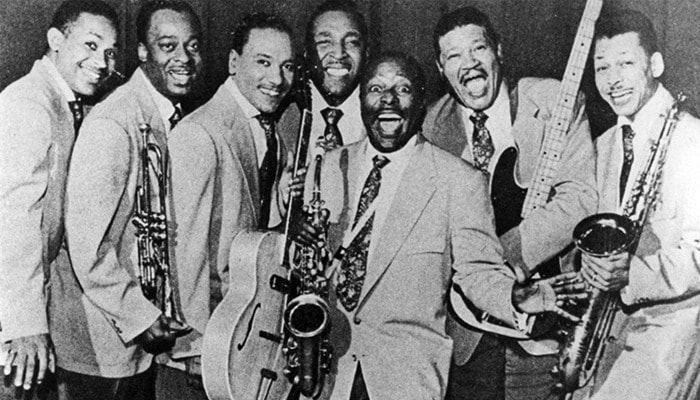
© Pictorial Press Ltd / Alamy Stock Photo
American singer, songwriter and musician Louis Jordan was one of the greats of the swing era. A popular bandleader, he became known as the King of the Jukebox, performing duets with some of the most famous singers of the time such as Ella Fitzgerald, Bing Crosby and Louis Armstrong. His career was at its peak during the 1930s and 1950s, when he also became an actor, playing cameo roles in mainstream feature films. To showcase his musical talent, he also starred in two movies made specially for him - Beware in 1946 and Reet Petite and Gone in 1947. He released dozens of hit songs during the 1940s and had five consecutive number one singles from July 1946 until May 1947, grabbing the top spot for 44 consecutive weeks. As well as being one of Decca Records' biggest recording artists, he also made regular recordings for the Armed Forces Radio and was popular with the troops. Where it began It was no surprise that Jordan became a musician, as his father, James, was a music teacher by day and a big band leader in his spare time. He fronted two bands, the Brinkley Brass Band and the Rabbit Foot Minstrels - a touring variety troupe, popular in the American South. Born in 1908, Jordan grew up in Brinkley, Arkansas, surrounded by music. He was taught by his father to play the clarinet. Rather than doing farm work, he played in his father's bands after school. He also learned to play the piano and alto saxophone, which became his main instrument. After majoring in music at Arkansas Baptist College, he joined the Rabbit Foot Minstrels. In 1932, after moving to New York, his career took off and he played in several bands, including the famous Savoy Ballroom Orchestra, led by Chick Webb. This was a stepping stone for Jordan, who was soon lead vocalist, proving what a great showman he was. Ella Fitgerald was the lead female singer and she often sang duets with Jordan. Hit records After leaving the Savoy Ballroom Orchestra in 1938, Jordan started his own nine-piece band, Louis Jordan's Elks Rendez-Vous Band. They signed for Decca Records in December 1938 and subsequently became the Tympany Five, named after the tympani drums. During the 1940s, their recording career took off in a massive way. In an era when racial segregation was a major problem, Jordan crossed the race divide and appealed to all audiences. Recorded on 26th June 1946, their biggest hit was Ain’t Nobody Here But Us Chickens. The jump blues song was written by song writing duo, Alex Kramer and Joan Whitney. The original inspiration was said to be a reader's anecdote - published in Everybody's Magazine in 1908 - about a chicken thief who said, "There ain't nobody here exceptin' us chickens," when challenged by the farmer. After Jordan and his band recorded it for Decca, the single was released on a 78 rpm record. It entered the Billboard Rhythm and Blues Chart on 14th December 1946, quickly reaching number one, where it remained for 17 weeks. Lyrics meaning The song's lively tune was accompanied by light-hearted lyrics about chickens trying to sleep in their coop, while continually being thwarted by the farmer stomping around outside. Finally, they told him off for disrupting their much-needed slumber. It told how Farmer Brown locked up the barn for the night, but then thought he heard a sound in the henhouse. He shouted, "Who's there?" and awoke all the chickens. Annoyed at being disturbed, they called back, "There ain't nobody here but us chickens!" When the farmer still hovered around, they complained, "You're stomping around, shaking the ground, kicking up an awful dust!" They reminded him, "Tomorrow is a busy day. We've got things to do, we've got eggs to lay," as they urged him to "quiet yourself, stop that fuss ... hobble off and hit the hay!" Popular culture The song impressed fans of different musical genres and has remained a popular musical standard to this day, more than 70 years after it was first recorded. Cover versions have been recorded by Pat Boone, James Brown, the Jaye Brothers, Leon McAuliffe, BB King, Lisa Stansfield, Wee Willie Harris and many more. A hit cover version was recorded by Ray Benson’s band, Asleep at the Wheel, in 1978, turning it into a Western swing hit. The phrase, "Nobody here but us chickens", has made it into the Urban Dictionary as a result of the song. It's defined as a sarcastic answer, implying "Who else would be here?" but it can also mean, "Just the regular crowd". It can also be used to hide the fact someone is there who shouldn't be. Later career Jordan's musical career lasted until 1974 and he continued recording for various labels. The bandleader and trumpeter Chris Barber worked with Jordan on the album, Louis Jordan Sings, in 1962. In an interview in 2012, Barber described Jordan's talent as "frightening". He recalled Jordan as being "perfect" at what he did, as he had an amazing ability to sing while accompanying himself on the alto saxophone. The transition between the vocals and sax was so smooth that Barber said it "seemed to be simultaneous". Sadly, Jordan died of a heart attack at the age of 66 in February 1975, leaving the legacy of his wonderful music. He was inducted into the Rock and Roll Hall of Fame and described as "the father of Rhythm and Blues". MA Grigg’s country clothing features many top brands such as Joules, Barbour, Hunter, Timberland and more. Based in St Austell, Cornwall, we offer high-quality country clothing and leisurewear for all seasons. Please contact us for further details, or pop into our store in person.




